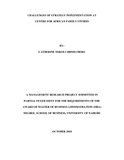| dc.description.abstract | Strategy implementation is often called the action phase of the strategic management process which is the most challenging. Executing strategy is a tougher more consuming management challenge than crafting strategy because of the wide array of managerial activities that have to be attended to. The demanding people-management skills required, the initiatives that need to be launched and moving, the bedeviling issues that need to be worked out, the resistance to change and the difficulties of integrating the efforts of work groups into a functioning whole. For the effective implementation of strategy an organization must achieve congruency between structure, leadership, culture and the capability of the organization.
This study had a special focus on challenges of strategy implementation at CAFS as the first objective and how these were overcome as the second objective. To achieve the said objectives a case study was carried out to gain an in-depth understanding of the challenges. A total of eleven respondents were interviewed by use of an interview guide. Some of the limitations encountered during the study included loss of institutional memory as a result of the restructuring process.
There was alignment between the research findings and the literature review carried out. The major challenges as revealed in the study highlighted lack of visionary leadership, frequent change in leadership, lack of succession planning, inactive participation of board members coupled with conflict of interest, lack of financial resources, high staff turnover, poor communication and monitoring of the plan, inappropriate organization culture, an unclear organizational niche, lack of guidelines to implement the strategic plan, poor response to the environmental changes, resistance to change, lack of ownership of the strategic plan, poor resource mobilization and networking skills and setting unrealistic goals.
The research established that CAFS hired a consultant to assist in the turnaround strategy and recruitment of an executive director when it realized that it had challenges implementing the strategy. It also carried out a needs assessment situation analysis to find out why the subscription rate to the courses it offered revealed a downward trend. .The findings enabled the organization to make the necessary adjustment to the courses. To boost its income the organization took on writing more proposals and ventured into other areas that would enable it earn more income such as conference management and doing more technical assistance. In addition the organization hired consultants to carry out assignments as a cost cutting measure.
The organization was bloated therefore it restructured and became lean. The researcher recommends that a similar study be carried out on organizations that are of the same size and operate in areas of intervention that are close to CAFS so as to establish if the challenges of strategy implementation encountered are similar to those of CAFS or unique. | en_US |

